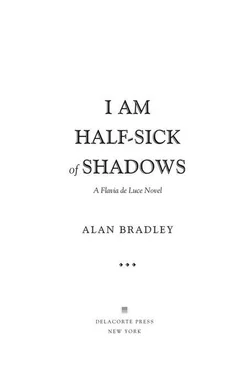Alan Bradley - I Am Half-Sick of Shadows
Здесь есть возможность читать онлайн «Alan Bradley - I Am Half-Sick of Shadows» весь текст электронной книги совершенно бесплатно (целиком полную версию без сокращений). В некоторых случаях можно слушать аудио, скачать через торрент в формате fb2 и присутствует краткое содержание. Жанр: Старинная литература, на английском языке. Описание произведения, (предисловие) а так же отзывы посетителей доступны на портале библиотеки ЛибКат.
- Название:I Am Half-Sick of Shadows
- Автор:
- Жанр:
- Год:неизвестен
- ISBN:нет данных
- Рейтинг книги:5 / 5. Голосов: 1
-
Избранное:Добавить в избранное
- Отзывы:
-
Ваша оценка:
- 100
- 1
- 2
- 3
- 4
- 5
I Am Half-Sick of Shadows: краткое содержание, описание и аннотация
Предлагаем к чтению аннотацию, описание, краткое содержание или предисловие (зависит от того, что написал сам автор книги «I Am Half-Sick of Shadows»). Если вы не нашли необходимую информацию о книге — напишите в комментариях, мы постараемся отыскать её.
I Am Half-Sick of Shadows — читать онлайн бесплатно полную книгу (весь текст) целиком
Ниже представлен текст книги, разбитый по страницам. Система сохранения места последней прочитанной страницы, позволяет с удобством читать онлайн бесплатно книгу «I Am Half-Sick of Shadows», без необходимости каждый раз заново искать на чём Вы остановились. Поставьте закладку, и сможете в любой момент перейти на страницу, на которой закончили чтение.
Интервал:
Закладка:
“Something horrid has happened to Phyllis Wyvern,” I told him. “In the Blue Bedroom.”
“I see.” Dogger nodded and vanished for a moment into the shadows of his room, and when he returned, he was wearing a pair of spectacles. I must have gaped a little, since I had never known him to use them before.
The two of us, Dogger and I, made our way silently back upstairs by the quickest route, the foyer, which involved yet another trek among the sleeping bodies. If the moment hadn’t been so serious, I’d have laughed at Dogger’s long legs picking their way like a wading heron between Bunny Spirling’s distended stomach and the outflung arm of Miss Aurelia Puddock.
Back in the Blue Bedroom, I closed the door behind us. Since my fingerprints were on the handle anyway, it wouldn’t make any difference.
The projector was still making its unnerving flap-flap ping noise as Dogger walked slowly round Phyllis Wyvern’s body, squatting to look into each of her ears and each of her eyes. It was obvious that he was saving the bow of ciné film around her neck for last.
“What do you think?” I asked finally, in a whisper.
“Strangulation,” he said. “Look here.”
He produced a cotton handkerchief from his pocket and used it to pull down one of her lower eyelids, revealing a number of red spots on the inner surface.
“Petechiae,” he said. “Tardieu’s spots. Asphyxia through rapid strangulation. Definitely.”
Now he turned his attention to the black bow of film that ringed the throat, and a frown crossed his face.
“What is it, Dogger?”
“One would expect more bruising,” he said. “It does not occur invariably, but in this case one would definitely expect more bruising.”
I leaned in for a closer look and saw that Dogger was right. There was remarkably little discoloration. The film itself was black against Phyllis Wyvern’s pale neck, the image on many of its frames clearly visible: a close-up shot of the actress herself in ruffled peasant blouse against a dramatic mackerel sky.
The realization hit me like a hammer.
“Dogger,” I whispered. “This blouse, shawl, and skirt—it’s the same costume she’s wearing in the film!”
Dogger, who was looking reflectively at the body, his hand to his chin, nodded.
For a few moments, there was a strange quiet between us. Until now, it had been as if we were friends, but suddenly, at this particular moment, it felt as if we had become colleagues—perhaps even partners.
Possibly I was emboldened by the night, although it might have been a sense of something more. A strange feeling of timelessness hung in the room.
“You’ve done this before, haven’t you,” I asked suddenly.
“Yes, Miss Flavia,” Dogger said. “Many times.”
I had always felt that Dogger was no stranger to dead bodies. He had, after all, survived more than two years in a Japanese prisoner-of-war camp, after which he had been put to work for more than a year on the notorious Death Railway in Burma, any single day of which would have given him more than a nodding acquaintance with death.
Aside from Mrs. Mullet’s whispered tales in the kitchen, I knew little about Dogger’s military service—or, for that matter, my father’s.
Once, as I watched Dogger trim the rose bushes on the Visto, I had tried to question him.
“You and Father were in the army together, weren’t you?” I asked, in so casual and offhanded a manner that I hated myself for having bungled it before I even began.
“Yes, miss,” Dogger had said. “But there are things which must not be spoken of.”
“Even to me?” I wanted to ask.
I wanted him to say “ Especially to you,” or something like that: something I could mull over deliciously in the midnight hours, but he did not. He simply reached among the thorns and, with a couple of precision snips, deadheaded the last of the dying roses.
Dogger was like that—his loyalty to Father could sometimes be infuriating.
“I think,” he was saying, “you’d best slip down and awaken Dr. Darby … if you wouldn’t mind, of course.”
“Of course,” I said, and letting myself out, made for the stairs.
To my surprise, Dr. Darby was not where I had last seen him: The spot where he had rested was empty, and he was nowhere in sight.
As I wondered what to do, the doctor appeared from beneath the stairs.
“Telephone’s bust,” he said, as if to himself. “Wanted to call Queenie and let her know I’m still respirating.”
Queenie was Dr. Darby’s wife, whose terrible arthritis had confined her to a wheelchair.
“Yes, Mrs. Richardson tried to use it last night. Don’t you remember?”
“Of course I do,” he said snappishly. “It’s just that I’d forgotten.”
“Dogger has asked if you’d mind coming upstairs,” I said, taking care not to give out any details in case one of the sleepers might be listening to us with their eyes closed. “He’d like your advice.”
“Lead on, then,” Dr. Darby said, with surprisingly little reluctance.
“ ‘… amid the encircling gloom,’ ” he added, extracting his first mint of the day from his waistcoat pocket.
I led the way upstairs to the Blue Bedroom, where Dogger was still crouched beside the corpse.
“Ah, Arthur,” Dr. Darby said. “Again I find you on the scene.”
Dogger looked from one of us to the other with something like a smile, and then he was gone.
“We’d better be having the police,” Dr. Darby said, after making the same examination of Phyllis Wyvern’s eyes that Dogger had already done.
He felt one of the limp wrists and applied his thumb to the angle of the jaw.
“Is life extinct, Doctor?” I asked. I had heard the phrase on a wireless program about Philip Odell, the private eye, and thought it sounded much more professional than “Is she dead?”
I knew that she was, of course, but I liked to have my own observations confirmed by a professional.
“Yes,” Dr. Darby said, “she’s dead. You’d better roust out that German chap—Dieter, is it? He looks as if he’d be good with skis.”
Fifteen minutes later I was in the coach house with Dieter, helping him strap the skis to his boots.
“Did these belong to your mother?” he asked.
“I don’t know,” I said. “I suppose so.”
“They are very good skis,” he said. “Madshus. In Norway, they were made. Someone has looked after them.”
It must have been Father, I thought. He came here sometimes to sit in Harriet’s old Rolls-Royce, as if it were a glass chapel in a fairy tale.
“Well, then,” Dieter said at last. “Off we go.”
I followed him as far as the Visto, climbing in my rubber boots from drift to drift. As we passed the wall of the kitchen garden, I caught a glimpse of a face at the driver’s window of one of the lorries. It was Latshaw.
I waved, but he did not return my greeting.
When the snow was too deep to follow, I stopped and watched until Dieter was no more than a tiny black speck in the snowy wastes.
Only when I could no longer see him did I go back into the coach house.
I needed to think.
I climbed up into the backseat of Harriet’s old Rolls-Royce and wrapped myself in a motoring rug. Words like “warm” and “snug” swam into my mind.
When I awoke, the clock of the Phantom II was indicating a silent five forty-five A.M.
“What on earth—” Mrs. Mullet said, obviously surprised to see me coming in through the kitchen door. “You’ll freeze to death!”
I shrugged in my cardigan.
“I don’t care,” I said, hoping for a little sympathy and perhaps an advance on the Christmas pudding, which was one of the few dishes that she cooked to my satisfaction.
Читать дальшеИнтервал:
Закладка:
Похожие книги на «I Am Half-Sick of Shadows»
Представляем Вашему вниманию похожие книги на «I Am Half-Sick of Shadows» списком для выбора. Мы отобрали схожую по названию и смыслу литературу в надежде предоставить читателям больше вариантов отыскать новые, интересные, ещё непрочитанные произведения.
Обсуждение, отзывы о книге «I Am Half-Sick of Shadows» и просто собственные мнения читателей. Оставьте ваши комментарии, напишите, что Вы думаете о произведении, его смысле или главных героях. Укажите что конкретно понравилось, а что нет, и почему Вы так считаете.











